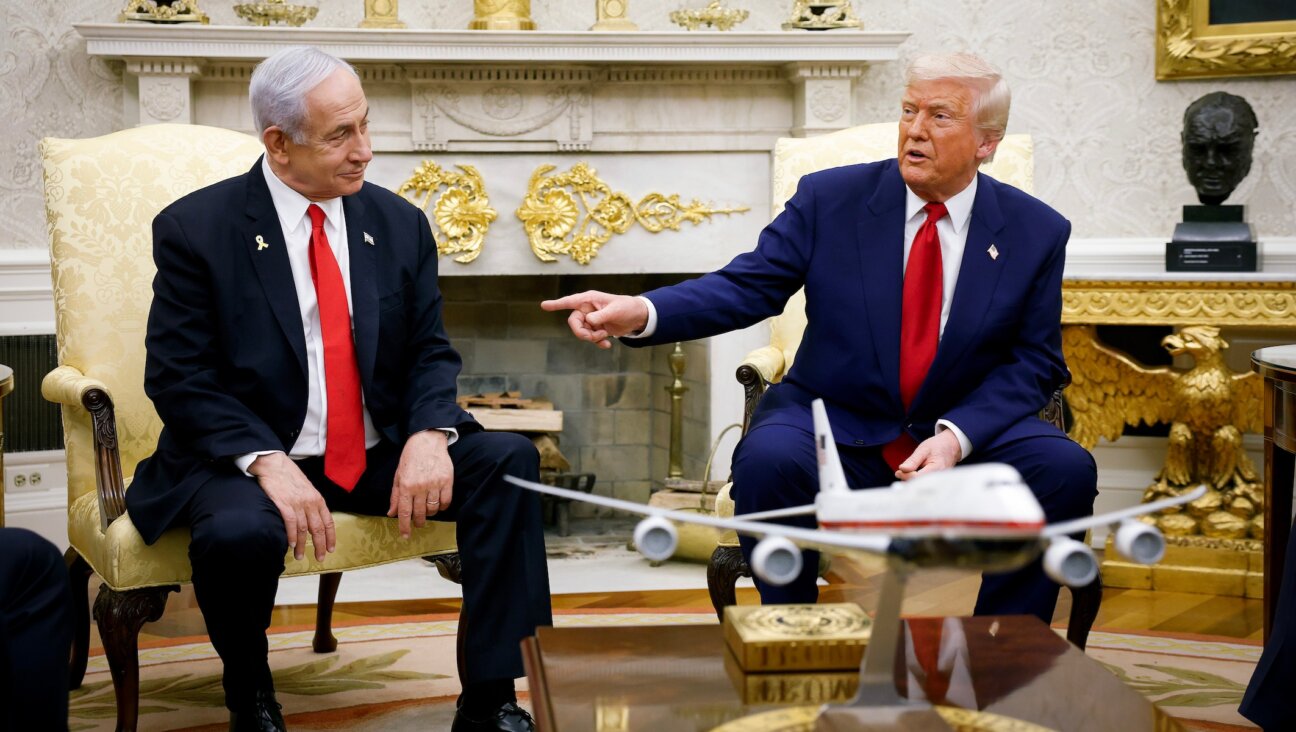Embattled Middle East Hand Strikes Back At Political Critics
For an expanded version of this article, click here.
Washington — One of the experts who has advised Barack Obama’s campaign on Middle East issues is striking out against critics who have used him to criticize the Illinois senator’s views on Israel.
Robert Malley, a former special assistant to President Bill Clinton on Israel, told the Forward that the attacks on him by some pro-Israel advocates have “crossed the line.”
Malley, who now heads the Middle East and North Africa program at the International Crisis Group, emphasized his strong support for Israel and explained his views on the need to engage in talks with Iran and Syria and find ways to communicate with Hamas.
According to a statement from the Obama campaign, Malley is one of several experts who had offered advice to the campaign on Middle East policy. This role has taken center stage in recent weeks as right-wing groups and individuals tried to argue that Malley holds anti-Israeli views and that this indicates Obama himself has a problem with his Middle East policy.
Writing on the Web site the American Thinker, Ed Lasky argued that Malley “represents the next generation of anti-Israel activism.”
Camera, the Committee for Accuracy in Middle East Reporting in America, published an article exploring Malley’s family roots. The article argues that “Malley’s parents were rabidly anti-Israel” and that Malley’s articles on Middle East issues “demonize Israel only slightly less than his father.”
Malley, in his first public response to the allegations, said “it tends to cross the line when it becomes as personal and as un-based in facts as some of these have been.”
Speaking of his father’s views, Malley said that while he loved and respected his father — who passed away last year — he did not agree with him on everything.
“I found [the attacks] to be an odd guilt by association,” he said.
Malley received support this week from five leading former policy officials, all Jewish and all known to be strong supporters of Israel. An open letter defending Malley was written on Tuesday by former national security adviser Sandy Berger and former State Department officials Dennis Ross, Martin Indyk, Aaron David Miller and Daniel Kurtzer.
Responding to what they call “a series of vicious, personal attacks” against Malley, the former officials write: “These attacks are unfair, inappropriate and wrong.”
The letter is particularly notable because, according to press reports, Berger and Indyk have been advising Obama’s opponent, Hillary Clinton on Middle East policy.
The letter adds that while disagreements on policy exist, there is no disagreement regarding the special relations between the U.S. and Israel: “We have worked with Rob closely over the years and have no doubt he shares this view and has acted consistent with it.”
Malley drew criticism from the pro-Israel community after co-authoring an article in the New York Review of Books arguing that the blame for the failure of the 2000 Camp David peace talks should be divided between all three leaders who were present: Yasser Arafat, Ehud Barak and Bill Clinton.
This article was considered controversial, since mainstream policy analysts in Israel and America had pointed to Arafat as having sole responsibility for the failed talks. Later, however, other scholars and former officials voiced similar views to those of Malley.
Today, Malley still stands out for his calls to engage in negotiations with Syria and Iran and for finding “some kind of accommodation” to deal with Hamas.
“If you want to have movement between Israel and the Palestinian Authority you’re going to have to find some way of neutralizing Hamas’ spoiling capacity and that means to some extent, to some extent, engaging with it,” Malley said, adding that he does not believe America should be the side dealing with Hamas.
The Bush administration and Olmert’s government in Israel strongly oppose dealing with Hamas or breaking the wall of isolation surrounding Iran. Olmert does not, however, oppose talks with Syria.
The former administration Middle East expert also called for exploring diplomatic possibilities with Syria and Iran, stressing he does not believe talks should be seen as a prize given to leaders of rogue regimes or as a threat to Israel.
The Forward is free to read, but it isn’t free to produce

I hope you appreciated this article. Before you go, I’d like to ask you to please support the Forward.
Now more than ever, American Jews need independent news they can trust, with reporting driven by truth, not ideology. We serve you, not any ideological agenda.
At a time when other newsrooms are closing or cutting back, the Forward has removed its paywall and invested additional resources to report on the ground from Israel and around the U.S. on the impact of the war, rising antisemitism and polarized discourse.
This is a great time to support independent Jewish journalism you rely on. Make a gift today!
— Rachel Fishman Feddersen, Publisher and CEO
Support our mission to tell the Jewish story fully and fairly.
Most Popular
- 1

News Who is Alan Garber, the Jewish Harvard president who stood up to Trump over antisemitism?
- 2

Opinion The dangerous Nazi legend behind Trump’s ruthless grab for power
- 3

News Student protesters being deported are not ‘martyrs and heroes,’ says former antisemitism envoy
- 4

Opinion What Jewish university presidents say: Trump is exploiting campus antisemitism, not fighting it
In Case You Missed It
-

Culture This Jewish New Yorker survived the Holocaust and the Hungarian Revolution, and is still helping others today
-

Fast Forward Trump says he and Netanyahu are ‘on the same side of every issue’ following talks on Iran, tariffs
-

Fast Forward California school board members accused of antisemitism during contentious meeting
-

Fast Forward Over 100 Chicago-area rabbis and cantors condemn Trump’s campus crackdown
-
Shop the Forward Store
100% of profits support our journalism
Republish This Story
Please read before republishing
We’re happy to make this story available to republish for free, unless it originated with JTA, Haaretz or another publication (as indicated on the article) and as long as you follow our guidelines.
You must comply with the following:
- Credit the Forward
- Retain our pixel
- Preserve our canonical link in Google search
- Add a noindex tag in Google search
See our full guidelines for more information, and this guide for detail about canonical URLs.
To republish, copy the HTML by clicking on the yellow button to the right; it includes our tracking pixel, all paragraph styles and hyperlinks, the author byline and credit to the Forward. It does not include images; to avoid copyright violations, you must add them manually, following our guidelines. Please email us at [email protected], subject line “republish,” with any questions or to let us know what stories you’re picking up.













